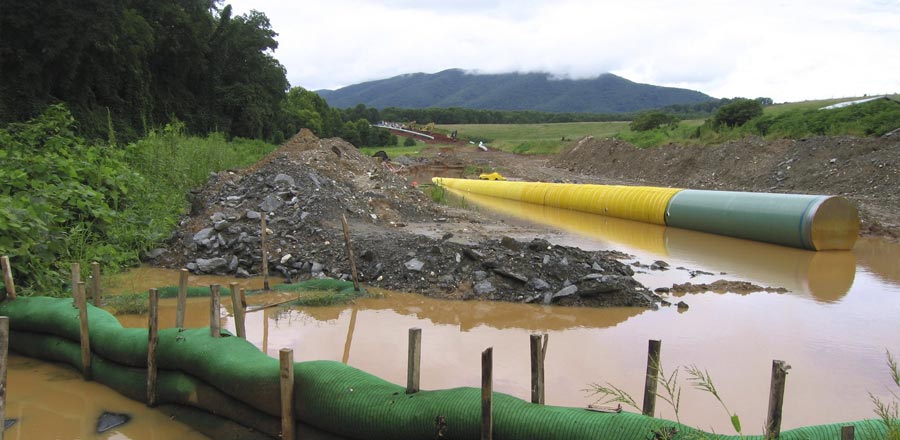Federal and State Agencies Consider New Water Permits for Controversial Pipelines

Anne Way Bernard’s field in Franklin County, Va., often floods due to the Mountain Valley Pipeline’s inadequate stormwater control. Photo by Anne Way Bernard
The roughly 300-mile fracked gas Mountain Valley Pipeline still lacks several federal and state permits that would allow it to cross waterways.
On Aug. 25, the Virginia Department of Environmental Quality allowed a draft Clean Water Act certification for the Mountain Valley Pipeline to move forward. The West Virginia Department of Environmental Protection is considering a similar certification. If both states approve those measures, the U.S. Army Corps of Engineers would be able to issue a permit that would allow developers of the roughly 300-mile fracked gas pipeline to cut and blast through hundreds of streams and wetlands.
Critics of the pipeline, including Appalachian Voices, the nonprofit organization that produces The Appalachian Voice, hold that the Virginia State Water Control Board should deny the certification as MVP developers have failed to submit necessary information about possible impacts the pipeline would have on water quality. The U.S. Environmental Protection Agency has also spoken out against the pipeline’s aquatic impacts, recommending in a May 27 letter that the Army Corps not approve the water permit.
Alongside their preliminary approval, the Virginia DEQ also released a fact sheet that fails to address several problems raised by the EPA. The fact sheet does not address the cumulative impacts of pipeline-related environmental damage on watersheds and does not include an analysis showing that the pipeline could meet Virginia’s antidegradation requirements.
“We are confident that a full description of the likely impacts from the remaining work MVP proposes is being withheld for one simple reason – it is abundantly clear that MVP cannot plow through these waterbodies without causing unacceptable damages and violating state and federal laws,” said David Sligh with nonprofit conservation organization Wild Virginia in an Aug. 25 press release.
The DEQ will hold a series of public hearings and a public comment period. Following that, the State Water Control Board is expected to decide on the permit in December. West Virginia is required by the Army Corps to make a determination on a similar permit by the end of November and their public comment period has closed.
The Army Corps is expected to decide on the federal water permit at the start of 2022.
On the FERC Docket
On Aug. 13, the Federal Energy Regulatory Commission released an Environmental Assessment of Mountain Valley Pipeline’s request to bore under 180 water bodies in West Virginia and Virginia in docket CP21-57. A public comment period on the assessment closed on Sept. 13, and FERC is set to make a decision by Nov. 11. Appalachian Voices submitted a comment with more than 600 signatures requesting that FERC deny MVP’s request.
Pipeline developers’ previous request to bore under a large number of waterbodies was met with a deadlocked 2-2 vote from the FERC commission. On Sept. 9, President Joe Biden nominated utility regulator Willie Phillips to FERC. If Phillips is confirmed by the U.S. Senate, three of the panel’s five members would have been appointed by Democratic presidents.
MVP Southgate
On Aug. 13, the Federal Energy Regulatory Commission temporarily suspended the eminent domain privileges for Mountain Valley Pipeline Southgate that would allow developers of the proposed 73-mile extension of MVP into North Carolina’s Alamance and Rockingham counties to condemn private property along the route in order to build the pipeline and maintain a right-of-way. This decision was in response to 15 North Carolina state legislators who requested that FERC pause the company’s ability to use eminent domain while the pipeline has several missing permits and ongoing litigation.
In July, the executive summary for Duke Energy’s controversial North Carolina energy bill, HB 951, stated that some of MVP Southgate’s gas capacity could be used to transition one of North Carolina’s largest coal-fired power plants, Roxboro Steam Station, to methane gas. The bill has received a great deal of pushback from lawmakers, advocacy groups and citizens alike. Its odds of passage are uncertain, and it is unclear at this time how serious the proposal to supply gas to the Roxboro plant is, or if the capacity in Southgate would be enough to meet the needs of this conversion.
Lambert Compressor Station
The Lambert Compressor Station, which is proposed to be built outside of Chatham, Virginia, would be the sole compressor station for MVP Southgate. A public hearing for the compressor station’s air permit was supposed to be held at the summer Air Pollution Control Board meeting on July 7.
This July meeting was going to be held in-person in Richmond, without a virtual option. Critics, including Appalachian Voices, held that this would have stymied public participation from community members since the meeting would have been nearly three hours away and on a weekday.
After significant attention and pushback, the public hearing was postponed until the fall Air Pollution Control Board hearing in September, and then rescheduled for October. The Virginia Department of Environmental Quality has indicated the October hearing will be held near Chatham and there will be no remote access option for community members and other concerned citizens who spoke at the initial public hearing back in February. A coalition of environmental groups including Appalachian Voices have twice sent letters, on June 23 and Aug. 17, urging the DEQ to make the hearing more accessible due to public health concerns.
Related Articles
Latest News
More Stories

Leave a comment
Your email address will not be published. Required fields are marked *





Leave a Comment